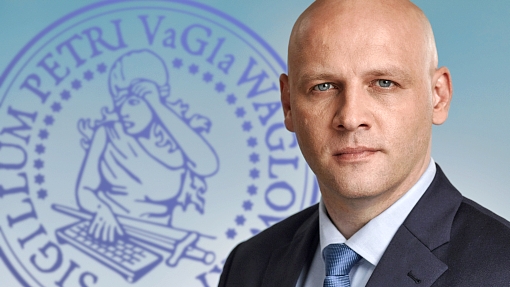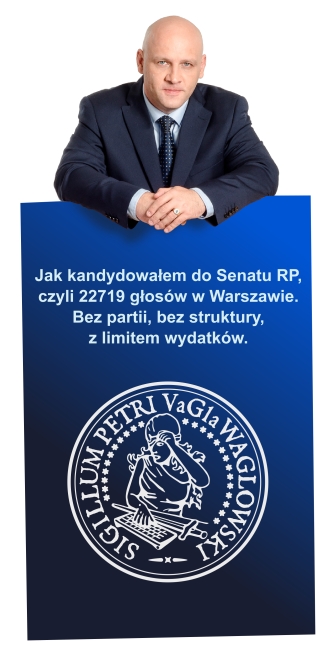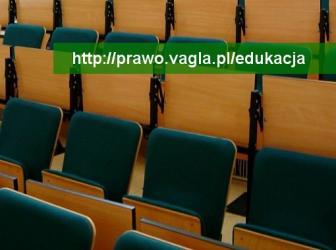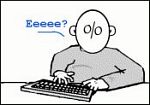In the era of globalization every single nation is a minority
Here is my speech I gave yesterday at The Third International Conference on Human Rights Education in Kraków (Poland):
My name is Piotr Waglowski and I´m a lawyer. I work with a few Non Governmental Organizations (from Poland), such as Modern Poland Foundation (Fundacja Nowoczesna Polska), Panoptykon Foundation, Internet Society Poland and E-State Foundation (Fundacja ePaństwo). At present I’m involved in activities concerning the development of a website called Sejmometr.pl. This website - truly speaking - is en example of re-use of public sector information.
Throughout my professional career I have taken great interest in the legal aspects of the information society. I have also created the website VaGla.pl where I analyze the modifications in legal regulations, I comment judgments and I take part in discussions about the internet law.
Recently, I have been writing a lot about the background of the ACTA international agreement negotiation and this is probably why the organizers of this Conference have asked me to dedicate my presentation to this topic. I, however, proposed another topic: National Languages in the Era of Globalization vs Equal Treatment by Public Authorities. So I should say a few words about linguistic rights.
Linguistic rights were first included as an international human right in the Universal Declaration of Human Rights: "Everyone is entitled to all the rights and freedoms set forth in this Declaration, without distinction of any kind, such as race, colour, sex, language..." Important documents for linguistic rights include the Universal Declaration of Linguistic Rights, the European Charter for Regional or Minority Languages and the Framework Convention for the Protection of National Minorities, as well as the International Covenant on Civil and Political Rights. However, these documents were created before the existence of the information society and before the era of globalization.
Although a lot has been said about ACTA. European Parliament rejects the agreement. Few days ago Commission agrees way forward for modernising copyright in the digital economy. According to my opinion today we should focus on the future. But it is still necessary to say a few words about ACTA.
When, in the beginning of this year in Warsaw and other cities, a lot of young and older people were protesting against ACTA, they were doing so because they had difficulties in getting the information about the contents of the resolutions lying on the negotiation table. Many have feared that these regulations will tighten the global law and strengthen the existing regulations concerning the intellectual property. As far as I’m concerned, the discussion revolved around the access to public information and the way for the citizens to participate in the process of lawmaking. I think that the most important thing had to do with the fact that an international agreement was being negotiated without taking into consideration the public opinion.
This conference is dedicated to education. It is called Conference on Human Rights Education. What education is? Education is a form of learning in which knowledge, skills, and habits of a group of people are transferred from one generation to the next through teaching, training, or research... Therefore when we reflect on human rights education we must also reflect on the accessibility of the materials concerning human rights. Information which can be used. The accessibility of such material is significant because without the accessibility of materials and information the process of education will be much more difficult.
I was told that the official language of this conference will be the English language. I have learned HTML (hyper text markup language) as my second language. I’m the lawyer, but as I had been dealing with weird issues such as webmastering, 3D graphic design or DNA genealogy I honestly didn’t have time to master foreign languages, useful in human communication. Therefore, you can imagine that I’m very stressed making a public appearance before such a big audience.
And that’s why I thought that it may be worthwhile to dedicate my presentation to the topic of language. Language and the way the right of access to public information is being implemented. Especially, when the world is globalizing, when important international treaties are negotiated without the participation of the citizens and international institutions are being created over the state borders. Institutions which have a crucial significance for citizen rights and freedoms. Such as international courts.
In reality, this subject, as well as ACTA, has a lot to do with the intellectual property rights, and especially with the copyrights.
The polish Copyright and Related Rights Act establishes that “the work derived from another author's work shall be copyrighted without detriment to the original work”. What "derivative work" means? It means in particular its translation, alteration or adaptation. The disposal and use of the derivative work shall depend on the permission of the author of the original work unless the author's economic rights to the original work have expired. However, the polish Act also establishes that "the copyright shall not cover legislative acts and their official drafts", shall not cover "official documents, and official materials”... It seems to me that the copyright will be one of the first obstacles to the human rights education.
Today’s copyright , as well as linguistic rights, is based on the nineteenth century legal concepts. It came into existence before the era of the “information society”. As I’m observing technology development It’s hard for me to escape the impression that in fact we are living in the future today.
We are surrounded by technology that we have known from science fiction novels and movies. Take the “universal translator” from the Star Trek world for example. This small device provided automatic translations during inter-galactic contacts…. Captain Kirk or Spock would speak to this long pole and an intelligent, orange gas cloud encountered on another planet would answer in beautiful English.
Ok. But we haven’t got so far yet. It is true that there already are automatic translators. And along with the use of such devices the problems appear.
One example of such problems was the use of an automatic translator in the construction of the polish Ministry of National Education website. It turned out that the automatic translator had decided to put a different name on a street where the ministry is situated and instead of calling it the Szuch’s Alley one could read on the website that the ministry is situated on Gestapo Alley. There was a lot of fuzz on the internet about it. The Ministry had to explain the situation. They explained that they had chosen a cost-free solution because the Ministry hasn’t got much money to spend on foreign language versions of its website. That’s how another problem appears (the first one are the above mentioned limitations related to the copyright monopolies): the translation related costs. The costs of creating available and generally understandable materials.
The problems with the ministry’s website occurred a couple of years ago. It seems that since then there has been some progress. There is technology which enables us to automatically translate even the spoken language.
A few weeks ago Rick Rashid - Chief Research Officer in Microsoft - has demonstrated the speech recognition software, which translates the speech to another language at the real time. During the conference an English to Chinese translation was presented. After watching the software presentation video I asked my polish colleagues from Microsoft: when will this tool be able to translate polish to other languages? They replied that it would probably take a few more years, because the Polish language isn’t as popular as English or Chinese.
Suppose we can already translate a text automatically. Such technology development should create undisturbed communication between the citizens, but also between the citizens and public authorities. Of course the patents must expire before it happens…
And talking about the patents…
Many of you must have heard about The European Commission's push to establish a common European Union’s patent system. A common patent court will be, probably, created in EU. The official language used in such a court will be either English or French or German. Other languages will not be allowed. That means that a significant number of lawyers won´t be able to participate in legal proceedings in such a court. It will increase the costs of litigation because you will have to hire a lawyer who not only knows the patent law but also speaks the language used in the court.
Doesn´t the admission of only one or a few official languages in the court action constitute a limitation of the right to access to court? After all, the right to fair trial is one of the basic human rights.
The interface of the Court of Justice of the European Union website has been translated to many languages, however, not all of the sentences of this Court are translated. The Court of Justice website contains a legal notice which informs that “The information and texts available on this site may be reproduced provided the source is acknowledged. Readers should be aware that certain parts of such information and texts might be protected under intellectual property law, in particular by copyright”. Previously, the notice regarding the sentences of the Court was even more severe. It established simply that the sentences cannot be reproduced because they are protected under copyright.
And another cross-border court - European Court of Human Rights - has translated its interface to two languages: French and English. The sentences of the Court are published in the official language of the court action. On the Court’s website we can also find the following notice: "Translations into non-official languages are not made by the Registry of the Court and it does not check their accuracy or linguistic quality. They are published in […] for information purposes only and the Court accepts no responsibility for their quality or content". We can also read that "Translations into non-official languages have also been added [..]. These were commissioned by the Council of Europe, which holds the copyright..."
Does the copyright related to the Human Rights Court sentences and judgments really exist? Does such copyright limit the preparation and the process of sharing the sentences translated to national languages?
Can we allow the existence of the information monopoly in the cross-border public, quasi official space? If yes, then we have something to do when it comes to human rights education because, the Human Rights Court sentences appear to be one of the most important educational materials.
We haven’t established jet an official, common, inter-galactic language. No Enterprise (It’s the name of the spaceship from Star Trek) can achieve the “warp” speed. We still live in a time when there’s cultural diversity. At the same time, the society becomes more and more global, the cross-border institutions are created, and the internet crosses the state borders. Therefore, we must give a new meaning to the notion of “public authorities”, and if that is the case, such notions as “linguistic rights” must also be given a new meaning.
We need to re-define the meaning of “public information” so that it includes the information concerning the EU or United Nations organs or others cross border bodies. Such movements as The Open Access and The Open Knowledge are becoming more and more significant. It is important to recognize the re-use of public sector information not only as an economic law, but most of all as a political law. The language of contact between the public authorities and the citizens will be one of the factors which we will have to evaluate in the light of the right to equal treatment by the public authorities and the right to no-discrimination.
If the decisions of the international authority influence the rights and freedoms of a particular person, such an authority should communicate with this person in a language that is understandable to her or him. Accessibility of public sector bodies' websites and accessibility of public institutions is not just a problem of people with disabilities. To properly address the problems of accessibility one must also consider the communication problems.
We’re not only speaking about the issue of the access to information, but also about the possibility of sending one’s suggestions in one’s own language during the public consultation process. Process, which might be organized by cross-border organizations. (It is worth mentioning that the European Commission allows sending remarks and comments in national languages). A national language is significant in the context of the right to no-discrimination, when we talk about the possibility of being elected to international bodies or taking part in global referendums. It is therefore significant when it comes to social participation in the process of lawmaking. The language is meaningful when it comes to the possibility of making legal claims, for example in the notice and takedown proceeding, when we want the host provider who hosting the information on the internet to stop violating our rights. A Polish, a German or a French should be able to write to a Chinese provider when she or he finds information which constitutes a law violation on the website. The provider should then react.
If in the era of globalization, the international institutions don’t publish the information in national languages used by people who are the subject to their decisions, if the possibility of the access to legal institutions is limited by the use of a selected language only - we will - as it seems to me - face direct discrimination.
In the era of globalization every single nation is a minority.
- Login to post comments
Piotr VaGla Waglowski

Piotr VaGla Waglowski - prawnik, publicysta i webmaster, autor serwisu VaGla.pl Prawo i Internet. Ukończył Aplikację Legislacyjną prowadzoną przez Rządowe Centrum Legislacji. Radca ministra w Departamencie Oceny Ryzyka Regulacyjnego a następnie w Departamencie Doskonalenia Regulacji Gospodarczych Ministerstwa Rozwoju. Felietonista miesięcznika "IT w Administracji" (wcześniej również felietonista miesięcznika "Gazeta Bankowa" i tygodnika "Wprost"). Uczestniczył w pracach Obywatelskiego Forum Legislacji, działającego przy Fundacji im. Stefana Batorego w ramach programu Odpowiedzialne Państwo. W 1995 założył pierwszą w internecie listę dyskusyjną na temat prawa w języku polskim, Członek Założyciel Internet Society Poland, pełnił funkcję Członka Zarządu ISOC Polska i Członka Rady Polskiej Izby Informatyki i Telekomunikacji. Był również członkiem Rady ds Cyfryzacji przy Ministrze Cyfryzacji i członkiem Rady Informatyzacji przy MSWiA, członkiem Zespołu ds. otwartych danych i zasobów przy Komitecie Rady Ministrów do spraw Cyfryzacji oraz Doradcą społecznym Prezesa Urzędu Komunikacji Elektronicznej ds. funkcjonowania rynku mediów w szczególności w zakresie neutralności sieci. W latach 2009-2014 Zastępca Przewodniczącego Rady Fundacji Nowoczesna Polska, w tym czasie był również Członkiem Rady Programowej Fundacji Panoptykon. Więcej >>







